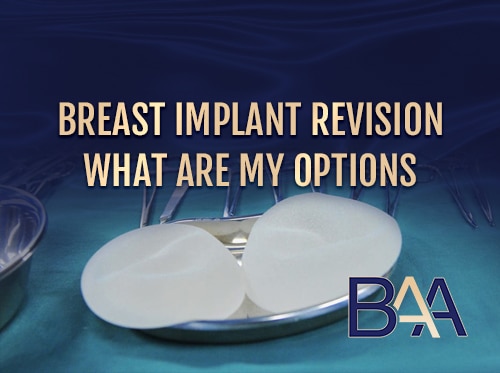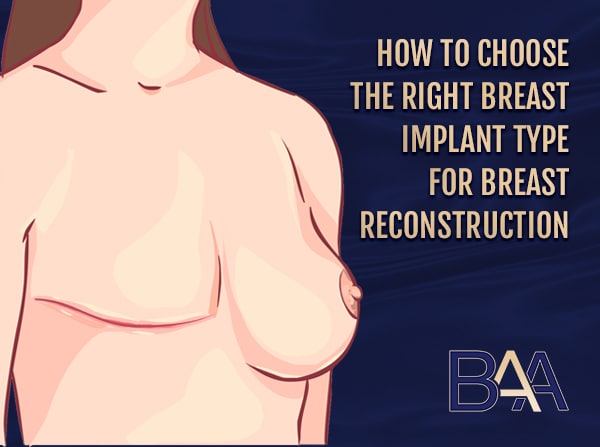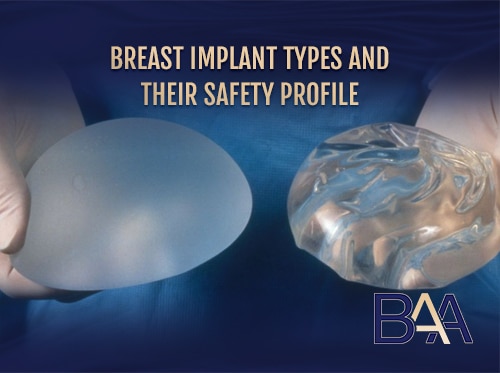Types of Breast Implants Covered by Insurance
Breast implants can be costly, prompting some women to consider using insurance to cover the cost. If you’re thinking about breast implant procedures, you may be unsure which type of breast implants are covered by insurance.
Medicare covers medically necessary breast implant procedures specified in the MBS guidelines. Private health insurance coverage varies based on the policy and level of the cover. This is why the patient needs to check with their insurance provider for specific coverage details.
These guidelines are specific and strict, covering only therapeutic procedures. This means that Medicare doesn’t cover cosmetic procedures because a procedure must pass certain criteria for coverage.
Australian Medicare system and MBS

Medicare provides a list of health services subsidised by the Australian government under MBS (Medicare Benefits Schedule). Patients can benefit from a range of services, such as consultations, operations, and diagnostic tests, which are all listed under specific MBS item numbers. This means that the item listed gets a rebate from the government.
For Medicare to cover a breast surgery procedure, a doctor must prove the condition medically necessary. This applies to reconstructive surgery, irrespective of whether the primary reason for breast augmentation was cosmetic or was covered by MBS.
However, Medicare doesn’t cover the hospital or breast implant fee. In most cases, the surgeon and anaesthesia fees are more than what the MBS provides, creating a charge GAP. The patient usually pays the extra cost and any other charge not covered under MBS.
Private Health Cover

If you have a private health fund, it will pay for the surgery if you qualify for an MBS item number. This may include the hospital fee, including Keller Funnel, and breast implant fees. You will also get some money back for the surgeon and anaesthetic fee.
However, different health insurance policies cover other breast augmentation procedures. Coverage also depends on the level of cover, bronze, silver, or gold. Therefore, you should find out the coverage level of the policy. In most cases, the private cover will cater for the bill partially, and you pay some amount out of pocket.
Before getting any treatment listed under MBS, you should call the insurance provider to know if they cover it. This is because many treatments come with exclusions and restrictions. It’s ideal for patients to ask if the insurance:
- Covers the cost of the implants
- Covers any complications from the implants
- Covers additional diagnostic tests such as mammogram images and MRIs
- Coverage will be affected by getting breast implants
- What are the terms of the insurance plan?
When is a Condition Regarded as Medically Necessary?

A medical practitioner may regard a condition medically necessary if it affects the patient’s overall health. Most health insurance requires proof, therefore, the doctor must prove to the health insurance that the condition is medically necessary.
Some of the breast augmentation procedures considered medically necessary include:
- Breast cancer treatment
- Breast reconstructive after mastectomy
- Some cases of breast reduction
- Correction of tuberous breast
- Implant removal, among others
Categories of Breast Surgery Covered by Insurance
MBS lists item numbers for breast augmentation procedures in which patients can claim Medicare rebates or utilise their private health cover. The patient needs to meet all the specific requirements listed within the Medicare Benefits Schedule.
Only a specialist surgeon can assign an item number for the surgical procedure. In addition, the patient needs a referral from a GP before surgery, verifying that the surgery is for medical reasons.
Below are some of the breast augmentation procedures covered by insurance and their specific MBS Item Numbers.
Implant Removal and/ or Reconstruction
Breast implant removal may be due to various reasons including, capsular contracture, implant leakages, necrosis, chest pain, malposition, calcium build-up, BIA-ALCL, and any breast implant-related illness. Reconstructive surgery is mainly performed to correct the breast after mastectomy or any other developmental abnormality. A specialist surgeon can perform different breast implant removal procedures like:
- Implant Revision- where the implants are removed and replaced with new ones
- En Bloc Implant Removal- the implant is removed together with the surrounding tissue
- Implant removal without the surrounding tissue
- Implant removal without replacement
- Implant removal and Mastopexy- removing the implant and reshaping/adjusting the breast tissue (breast lift surgery)
Medicare covers most implant removal options under Item Numbers 45548, 45551, 45553, and 45554. Patients should note that not all breast implant removal procedures will be covered because they must meet specific criteria. Patients with private health insurance may be eligible for rebates for medically necessary breast surgery procedures.
MBS Item Number 45554
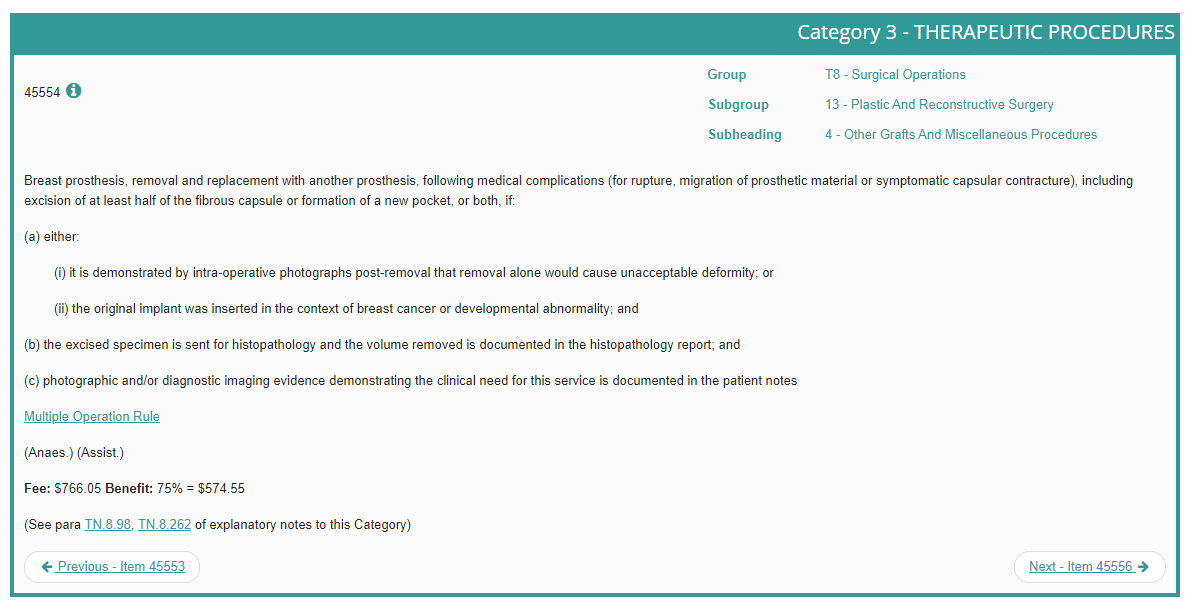
This involves removing and replacing the implant with another breast implant due to medical complications. It includes the formation of a new breast pocket or the excision of at least half of the surrounding capsule or both.
The procedure is eligible if:
- Post-removal intra-operative photographs show that implant removal alone will cause unacceptable deformity, or the original procedure involved breast implant insertion in the treatment of breast cancer or correcting development abnormality
- The removed specimen is taken for histopathology, and a histopathology report documents the capsule’s removed volume
- Diagnostic and/or photographic imaging demonstrating evidence for the procedure’s clinical need is documented in the patient’s note
The replacement breast implant should be the same size as the one removed. The benefits are not payable to patients performing the procedure to increase breast size solely.
MBS Item Number 45551
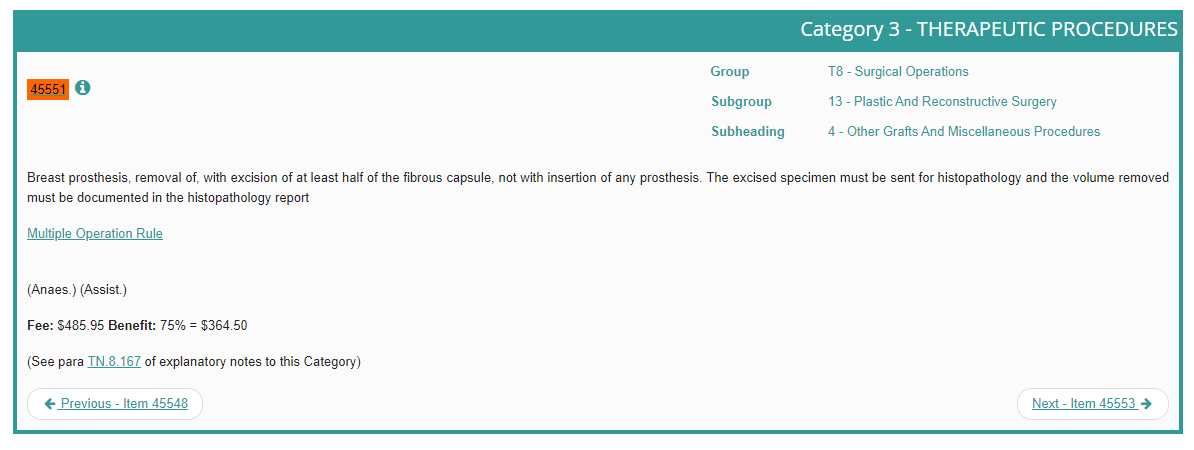
The item number provides for implant removal without replacement. The removal includes at least half of the affected capsule, which must be sent for histopathology, and a histopathology report must document the capsule’s removed volume.
To be eligible for a rebate under this item, the specialist surgeon should provide evidence that the procedure was a medical necessity due to a lump in the capsule, capsular contracture, or BIA-ALCL.
Breast Implant-Associated Anaplastic Large Cell Lymphoma (BIALCL) is eligible for Medicare benefits regardless of whether the initial breast surgery procedure was medically necessary. In addition to pathology, diagnostic imaging, and treatment benefits, BIA-ALCL also attracts MRI benefits under MBS Item Number 63547.
MBS Item Number 45548

This involves breast implant removal as an independent breast implant procedure. The removal should be medically necessary.
MBS Item Number 45553
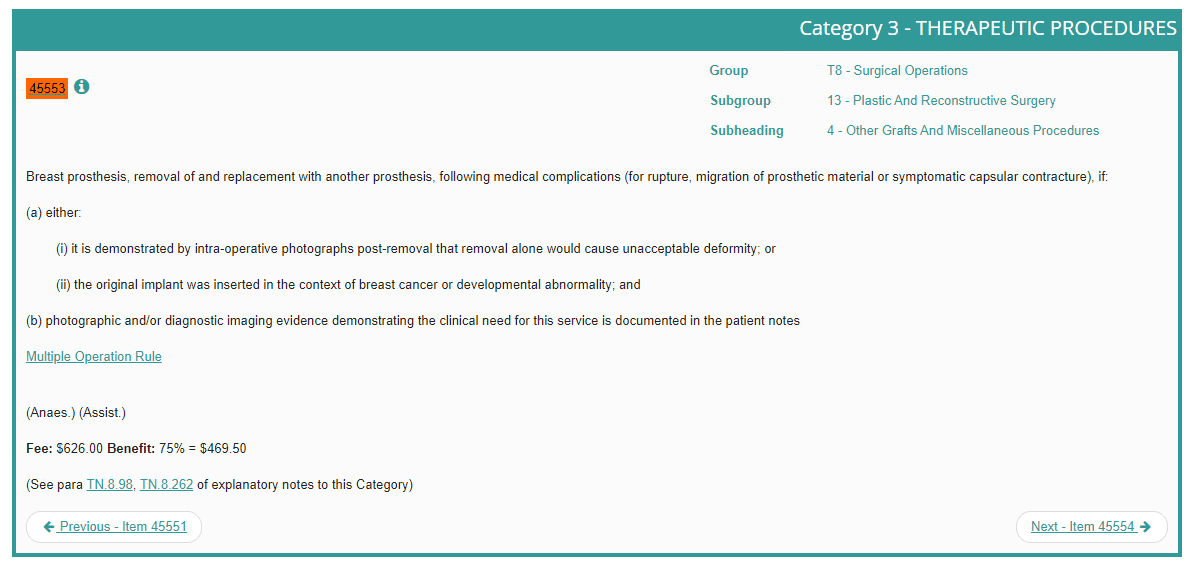
It involves the removal of the breast implant and replacement due to medical complications, including capsular contracture, rupture, or malposition. The replacement prosthesis should be the same size as the one removed, and the benefits are not payable for cosmetic surgery.
The procedure is eligible if:
- Post-removal intra-operative photographs show that implant removal alone will cause unacceptable deformity, or the original procedure involved breast implant insertion in the treatment of breast cancer or correcting development abnormality
- Diagnostic and/or photographic imaging demonstrating evidence for the procedure’s clinical need is documented in the patient’s note
Other Breast Augmentation Surgery MBS Item Numbers
Below are other breast augmentation and reduction mammaplasty procedures covered by Medicare.
MBS Item Number 45524
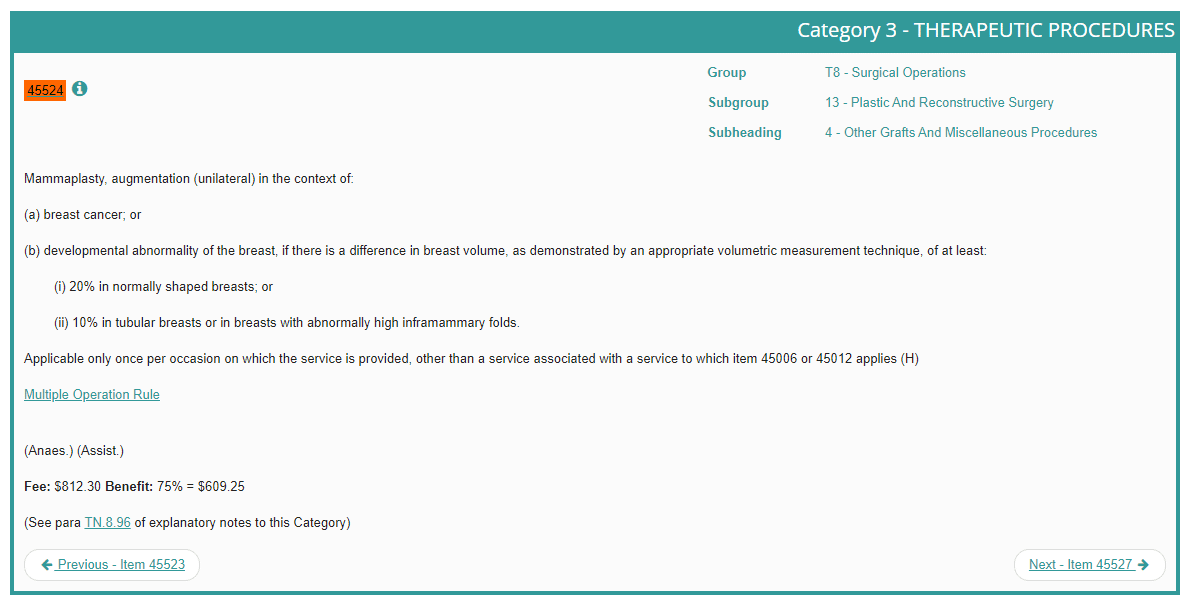
It involves unilateral augmentation mammaplasty in cases of:
- Breast cancer
- Breast development abnormality, leading to breast volume difference demonstrated by a volumetric measurement technique. The difference should be at least: 20% in normal-shaped breasts, or 10% in tubular breasts
Medicare benefits are not payable for plastic surgery procedures performed with the fat transfer technique.
MBS Item Number 45527
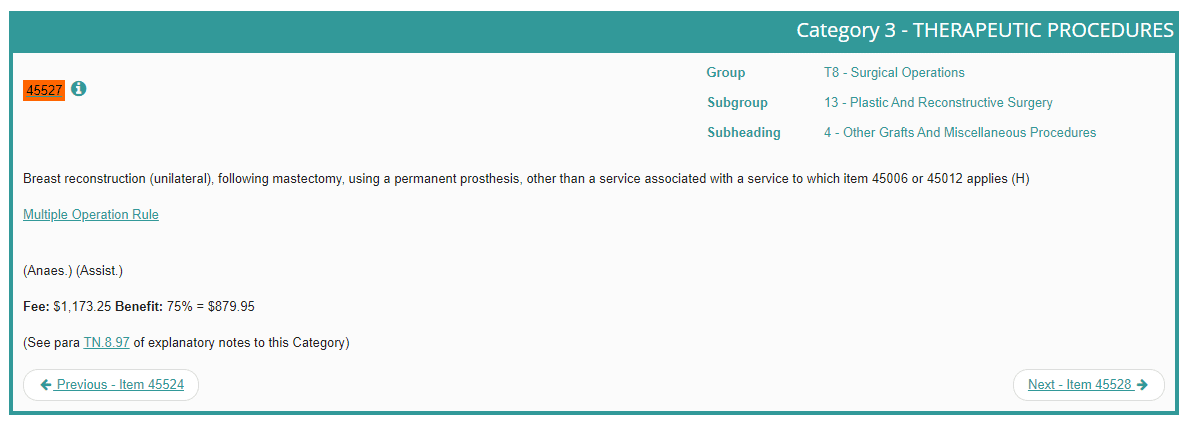
This involves unilateral breast reconstruction due to mastectomy, using a permanent prosthesis.
MBS Item Number 45528
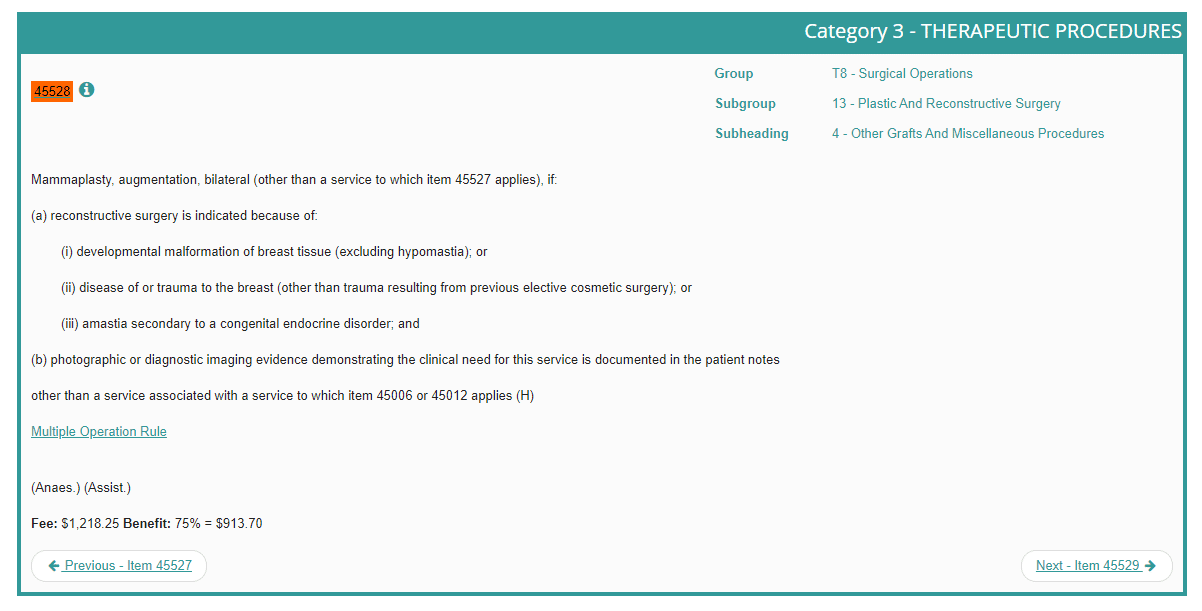
It involves bilateral augmentation mammaplasty except for services covered under MBS Item Number 45527. Reconstructive surgery is eligible in cases of:
- Breast tissue developmental malformation (excluding hypomastia)
- Breast trauma resulting from disease (excluding trauma caused by previous elective cosmetic surgery)
- Amastia secondary to a congenital endocrine disorder
The specialist surgeon should provide diagnostic and/or photographic imaging evidence showing the procedure’s medical necessity.
MBS Item Number 45520
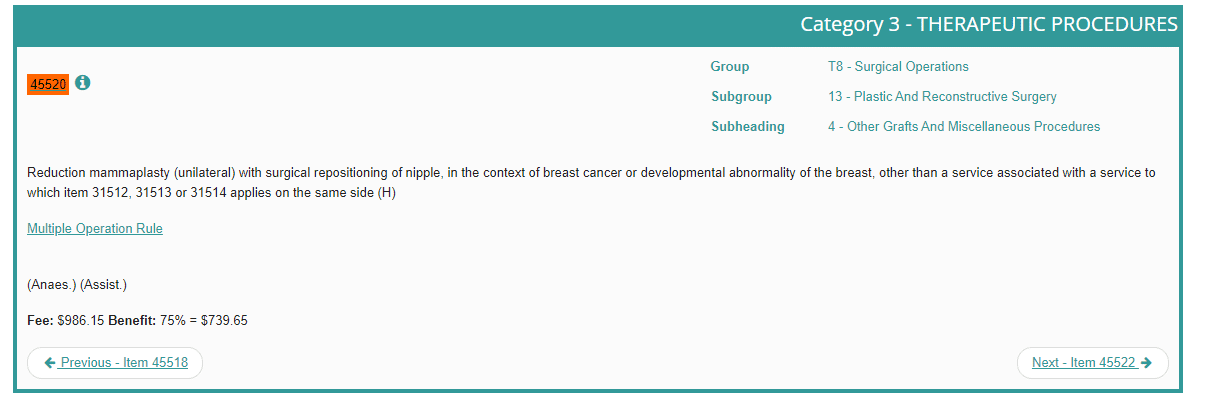
This covers unilateral reduction mammaplasty with surgical nipple repositioning in the context of developmental breast abnormality or breast cancer.
MBS Item Number 45523
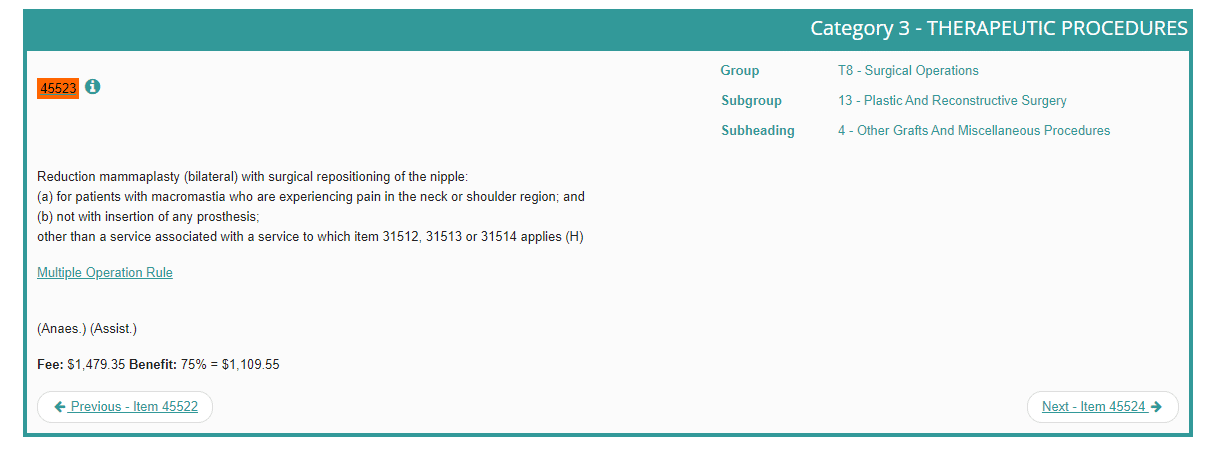
Bilateral reduction mammaplasty with surgical nipple repositioning. It’s eligible for patients with macromastia and having shoulder and neck region pain and not with the insertion of any breast implant.
MBS Item Number 45060
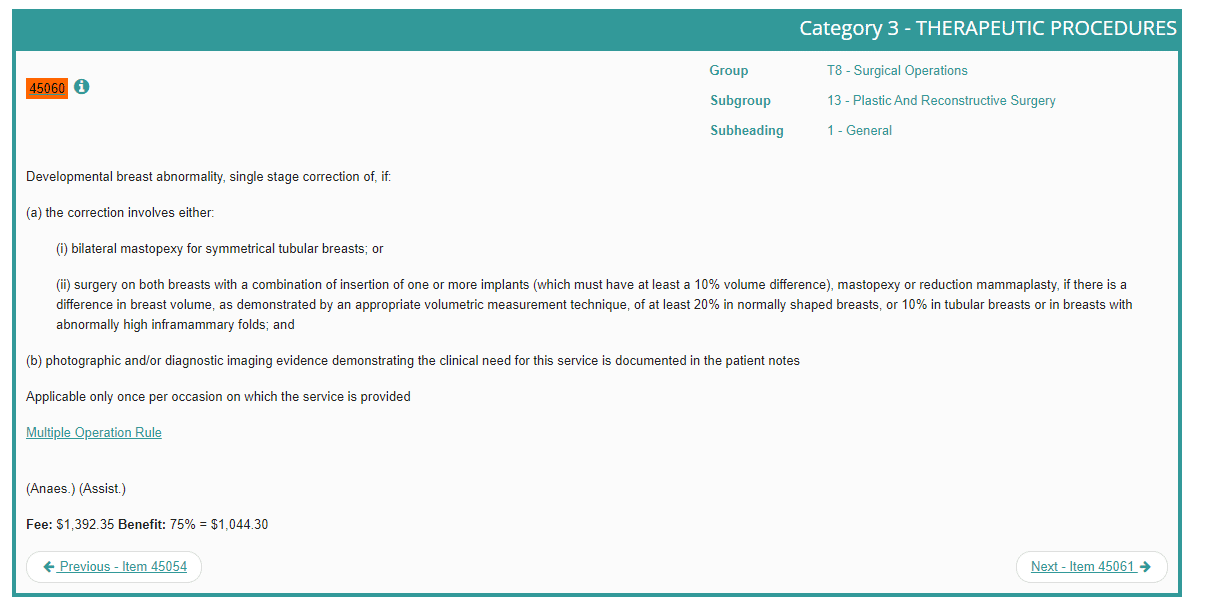
This covers the correction of tubular breast or breast asymmetry. The correction should involve either bilateral mastopexy in symmetrical tubular breast or surgery on all breasts with breast insertion on one or more implants, reduction mammaplasty, or mastopexy.
MBS Item Number 45558
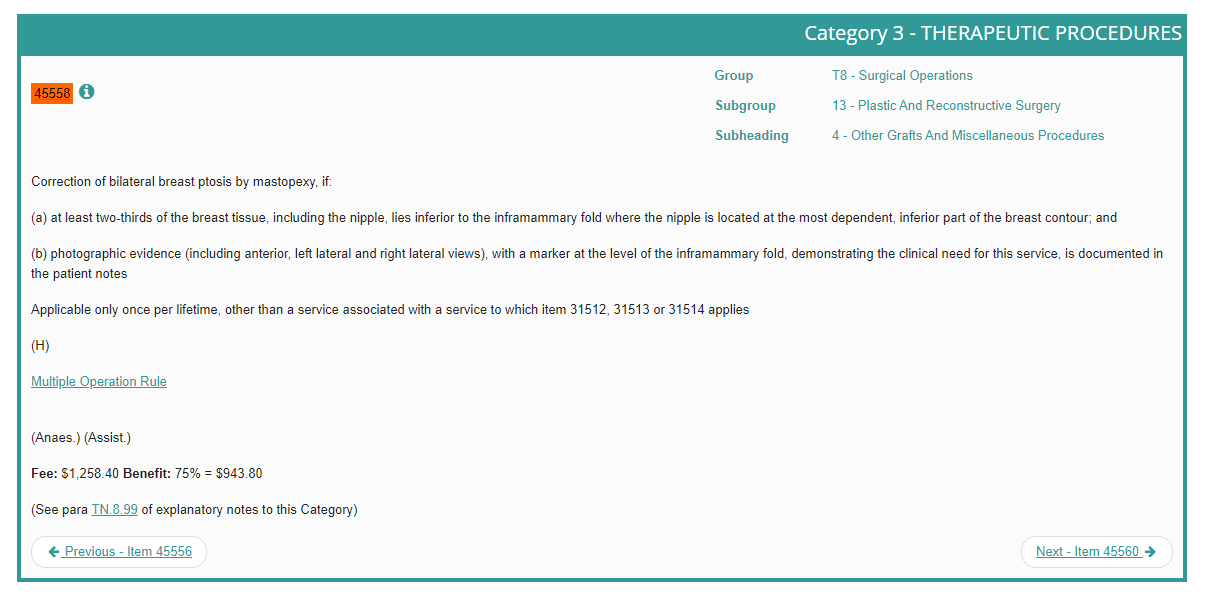
It involves bilateral breast ptosis correction in cases where at least two-thirds of breast tissue, including the nipple, is inferior to the inframammary fold.
MBS Item Number 31519
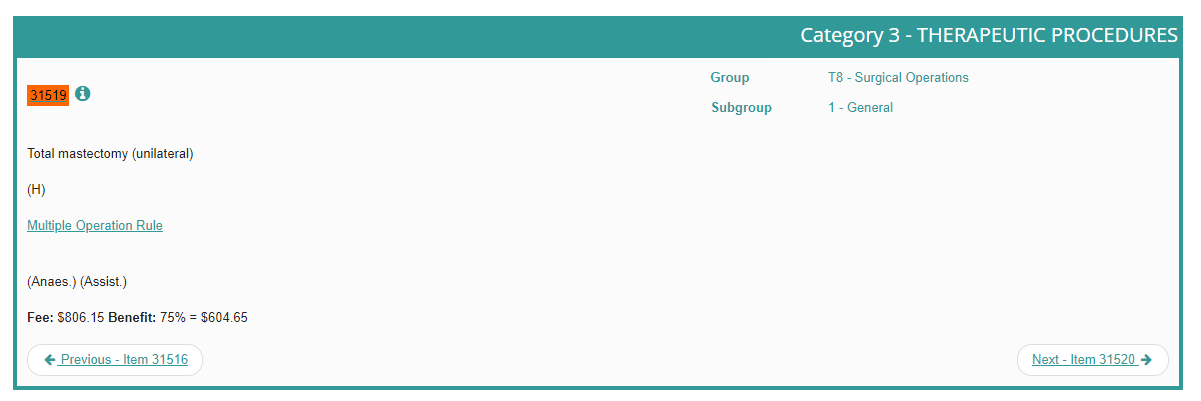
This item covers mastectomy due to breast cancer surgery.
FAQs
Below are some commonly asked questions regarding breast implant coverage by insurance.
Does Insurance Cover Cosmetic Breast Implant Surgery?
Medicare does not cover any breast augmentation performed for cosmetic purposes. Only procedures listed under Medicare Benefits Schedule are covered. Most private health insurance also covers items listed under MBS. For any insurance advice, consult a specialist surgeon and your health insurer before undergoing any breast augmentation procedure.
Will Private Health Insurance Cover the Whole Cost of Breast Augmentation?
Most private health insurance covers only part of the breast augmentation surgery costs of items listed under MBS. You should consult Medicare and the insurance health provider to know if the surgery will be covered.
Where Can I Find a Specialist Surgeon for Breast Augmentation in Newcastle?
Are you looking for Breast augmentation in Newcastle? Dr Bernard Beldholm, MBBS FRACS B.Sc (Med), is a specialist surgeon experienced in breast augmentation. Schedule your consultation and discuss any breast implants and insurance-related issues.
References
- Administration, T. G. (2023, February 7). Breast implant associated cancer (BIA-ALCL): Information for consumers. Therapeutic Goods Administration (TGA).
- Ducic, I., Iorio, M. L., & Al-Attar, A. (2010b). Chronic Headaches/Migraines: Extending Indications for Breast Reduction. Plastic and Reconstructive Surgery, 125(1), 44–49.
- Oo, M., Wang, Z., Sakakibara, T., & Kasai, Y. (2012). Relationship Between Brassiere Cup Size and Shoulder-Neck Pain in Women. The Open Orthopaedics Journal, 6(1), 140–142.
- Headon, H., Kasem, A., & Mokbel, K. (2015c). Capsular Contracture after Breast Augmentation: An Update for Clinical Practice. Archives of Plastic Surgery, 42(05), 532–543.
